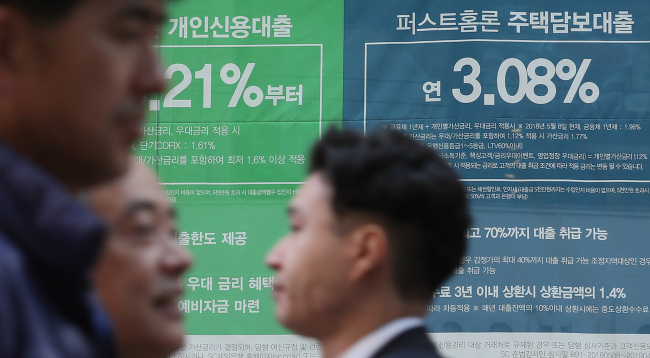A new set of regulations for local banks is set to take effect Wednesday, with the aim of further slowing down the pace of South Korea’s household credit growth.
The full-fledged enforcement comes after a grace period that began in March, during which commercial banks had to cap the volume of the high-risk retail loans they extended.
The full-fledged enforcement comes after a grace period that began in March, during which commercial banks had to cap the volume of the high-risk retail loans they extended.

Starting Wednesday, commercial banks are required to keep “highly risky loans” to individuals to no more than 10 percent of the volume of all household loans they extend. This includes mortgage loans and consumer loans. A “highly risky loan” is defined as a loan where the principal and interest combined exceed 90 percent of an individual’s annual income.
Commercial banks are also subject to the same rule when extending “risky loans” to retail clients -- that is, loans where the principal and interest combined exceed 70 percent of the client’s annual income. The volume of such loans cannot exceed 15 percent of the bank’s household loans.
Similar restrictions on retail loans will apply to provincial banks and state-led banks, but with looser restrictions on maximum loans.
As of end-June, Korea’s household credit reached 1,493.2 trillion won ($1.3 trillion), up 1.7 percent from end-March, according to the Bank of Korea’s preliminary data. Meanwhile, retail loans from financial institutions from January through September rose at the slowest pace since 2015, up 6.1 percent on-year or 50.2 trillion won, according to data by the Financial Supervisory Service.
The change augments measures unveiled in September intended to tame Korea’s housing market and discourage speculation. These range from tax hikes for multiple-homeowners to an increased housing supply in metropolitan areas. Korean rules that made it easier to borrow loans from financial institutions to buy homes have been blamed for soaring housing prices and soaring levels of household debt over the past three years.
According to data from the Korea Appraisal Board, apartment prices in some of the most affluent districts in the southern part of Seoul -- Gangnam, Seocho and Songpa -- were all on the decline the previous week for the first time in 18 weeks. The pace of growth for apartment prices in Seoul has slowed for seven straight weeks.
“What the government highlighted in the previous September measure was the supply side (rather than the) demand side,” said Lee Sang-young, an associate professor at Myongji University. “The new stringent measures (imposed on) lenders will result in dwindling demand in the housing market.”
By Son Ji-hyoung
(consnow@heraldcorp.com)
Commercial banks are also subject to the same rule when extending “risky loans” to retail clients -- that is, loans where the principal and interest combined exceed 70 percent of the client’s annual income. The volume of such loans cannot exceed 15 percent of the bank’s household loans.
Similar restrictions on retail loans will apply to provincial banks and state-led banks, but with looser restrictions on maximum loans.
As of end-June, Korea’s household credit reached 1,493.2 trillion won ($1.3 trillion), up 1.7 percent from end-March, according to the Bank of Korea’s preliminary data. Meanwhile, retail loans from financial institutions from January through September rose at the slowest pace since 2015, up 6.1 percent on-year or 50.2 trillion won, according to data by the Financial Supervisory Service.
The change augments measures unveiled in September intended to tame Korea’s housing market and discourage speculation. These range from tax hikes for multiple-homeowners to an increased housing supply in metropolitan areas. Korean rules that made it easier to borrow loans from financial institutions to buy homes have been blamed for soaring housing prices and soaring levels of household debt over the past three years.
According to data from the Korea Appraisal Board, apartment prices in some of the most affluent districts in the southern part of Seoul -- Gangnam, Seocho and Songpa -- were all on the decline the previous week for the first time in 18 weeks. The pace of growth for apartment prices in Seoul has slowed for seven straight weeks.
“What the government highlighted in the previous September measure was the supply side (rather than the) demand side,” said Lee Sang-young, an associate professor at Myongji University. “The new stringent measures (imposed on) lenders will result in dwindling demand in the housing market.”
By Son Ji-hyoung
(consnow@heraldcorp.com)








![[Graphic News] More Koreans say they plan long-distance trips this year](http://res.heraldm.com/phpwas/restmb_idxmake.php?idx=644&simg=/content/image/2024/04/17/20240417050828_0.gif&u=)
![[KH Explains] Hyundai's full hybrid edge to pay off amid slow transition to pure EVs](http://res.heraldm.com/phpwas/restmb_idxmake.php?idx=644&simg=/content/image/2024/04/18/20240418050645_0.jpg&u=20240419100350)






![[From the Scene] Monks, Buddhists hail return of remains of Buddhas](http://res.heraldm.com/phpwas/restmb_idxmake.php?idx=652&simg=/content/image/2024/04/19/20240419050617_0.jpg&u=20240419175937)

![[KH Explains] Hyundai's full hybrid edge to pay off amid slow transition to pure EVs](http://res.heraldm.com/phpwas/restmb_idxmake.php?idx=652&simg=/content/image/2024/04/18/20240418050645_0.jpg&u=20240419100350)

![[Today’s K-pop] Illit drops debut single remix](http://res.heraldm.com/phpwas/restmb_idxmake.php?idx=642&simg=/content/image/2024/04/19/20240419050612_0.jpg&u=)